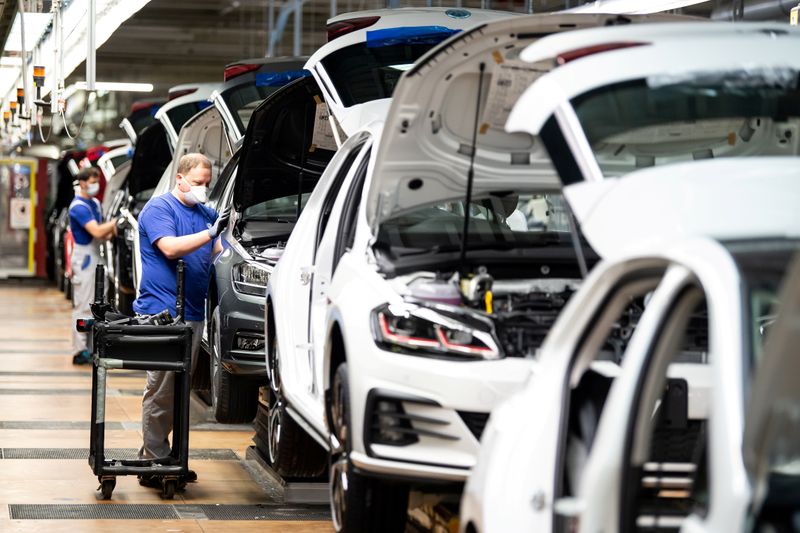By Joseph Nasr
BERLIN (Reuters) - German industrial orders rebounded moderately in May and a fifth of firms in Europe's biggest economy said in a survey published on Monday they feared insolvency, adding to expectations of a slow and painful recovery from the coronavirus pandemic.
Germany has withstood the pandemic better than other big European countries, recording fewer COVID-19 deaths, and its economy has been relatively resilient during more than six weeks of lockdown owing to generous stimulus packages and a decision to keep open factories and construction sites.
But data showing that industrial orders had risen by a record 10.4% during a month when restrictions were gradually lifted, almost a third less than forecast in a Reuters poll, dashed hopes of a quick return to pre-crisis business activity.
"The orders data signal that the manufacturing sector recession has overcome its low point," the Economy Ministry said. "But the low level of orders also shows that the recovery process is far from over."
Order intake was 30.8% lower than in February, before lockdown measures were imposed a month later to slow the spread of the coronavirus, and almost 30% weaker than in May 2019.
Fears of a slow recovery were compounded by an Ifo economic institute survey showing that 21% of firms fear the pandemic could force them to shut down, adding to expectations that mass insolvencies in the coming months will hamstring the economy.
BOOSTING DEMAND
The services sector is most affected, Ifo said. Some 85% of travel agents and tour operators said they were threatened with insolvency, followed by 76% of hotels and 67% of restaurants.
The government wants to revive the economy by boosting consumption through lower rates of value-added tax for the second half of the year and a one-off stipend for parents.
It has also rolled out short-time work, a form of state aid designed to encourage companies to keep employees on the payroll during a downturn, which has helped stabilise the labour market.
The picture is no better for Germany's export-oriented manufacturers, which had faced declining demand before the pandemic resulting from trade disputes between the United States and China, uncertainties linked to Britain's departure from the European Union and an automotive sector grappling with an expensive shift to electric vehicles.
The government expects the economy to shrink by 6.3% this year, which would be its deepest recession since World War Two.
Monday's data showed that order intake from the euro zone had surged by more than 20% compared with a 2% increase from countries outside the single currency bloc.
The United States and China are Germany's first and third biggest export markets, and a pronounced revival of the manufacturing sector in Europe's largest economy also depends on global trade disrupted by the pandemic returning to normal.
"Today's industrial orders data brings two important messages: the lifting of the lockdown measures has brought V-shaped surges in activity but the return to pre-crisis levels will not be easy," said ING economist Carsten Brzeski.
